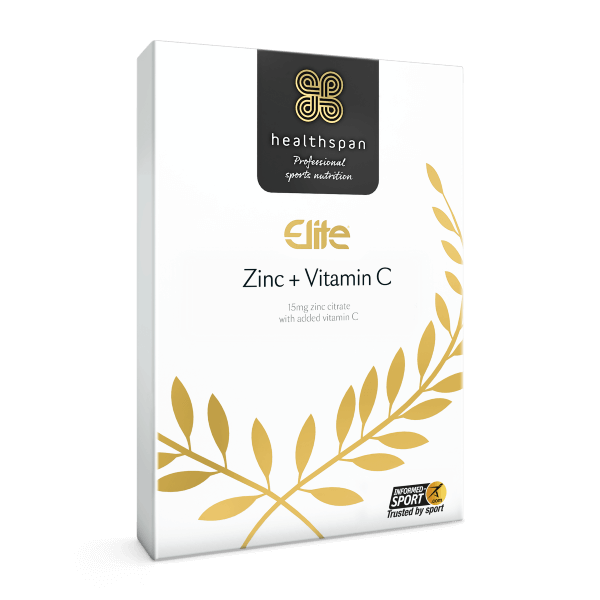We have all heard that there is nothing we can do for the common cold apart from letting nature take its course - but is this still the case?
If there was anything that could decrease the symptoms and/or speed up the recovery time this would have major benefits for athletes given that the cold can result in lost training days and impaired match day performance. It is therefore not surprising that there is a great deal of excitement with zinc acetate lozenges when it was suggested that at the correct dose they may actually help.
What is a common cold?
In the UK it has been estimated that the average adult will suffer from 2-4 colds per annum with some people having considerably more such as asthmatics. The symptoms of a cold usually clear up within 2 weeks although in some cases they can last longer. This means that over the course of a lifetime we spend approximately 2.5 years battling the symptoms of a cold! It is not surprising that it is called a common cold given that there are more than 200 viruses identified that can result in a cold.
In simple terms a cold is mild viral infection of the nose, throat, sinuses and upper airways. Symptoms can be mild including a runny nose, sore throat, sneezing and coughing although with more extreme colds symptoms can also include fever, headache and muscle soreness. The current advice is to rest, drink plenty of fluids, if necessary take painkillers (such as paracetamol and ibuprofen) and decongestant sprays (it must be pointed out that any elite athlete should check all medication on Global Dro prior to taking it to ensure it is not prohibited in their sport). However, the current advice could now change given the emerging evidence regarding Zinc acetate lozenges.
Zinc and the immune system - the advantage of the lozenge
For many years, it is has been known that zinc deficiency compromises the immune system increasing the risk of infections. In some developing countries where zinc deficiencies are common, supplementation with Zinc can reduce the risk of colds and even pneumonia. However, in developed countries like the UK giving supplemental zinc in the region of 15-20mg per day has consistently been shown to have no effects on illness in non-deficient people.
This observation almost ended interest in using Zinc to prevent colds. However, interest was re-ignited with the observation that a 3-year-old girl with Leukemia who dissolved a therapeutic dose of Zinc in her mouth rather than swallowing it was able to completely get rid of a cold within hours of taking it.1 This created the hypothesis that zinc dissolved in the mouth could be helped through local effects in the pharyngeal region (the part of the mouth behind the throat and nasal cavity) and this has been further substantiated given that similar doses of zinc swallowed in syrups are nowhere near as effective.
Zinc acetate - why this specific form and at what dose?
Following the early observation from Eby and colleagues, there followed a series of subsequent trials with differing results. The differing results may have been a result of the specific composition of the lozenge. Zinc lozenges are chelated with differing salts for example Zinc citrate or Zinc acetate. It appears that problems arise when zinc binds tightly to its salt (such as in Zinc citrate) resulting in reduced free zinc ions available to assist in the pharyngeal region. Zinc acetate however does not chemically bind to Zinc and therefore this specific form of zinc appears to be the most effective at alleviating symptoms of the common cold.
In a recent Meta-Analysis (a study that combines all appropriate studies into one big one to make a much stronger study) has suggested that in the correct form and at the correct dose supplementation of zinc lozenges can reduce cold duration by approximately 44%, or 401 days of less symptoms over a lifetime! (Hemila 2011). The dose seemed to be particularly important. In the meta-analysis there were no benefits if the total daily dose of elemental zinc was less than 75mg whereas clear benefits were observed in the studies that provided greater than 75mg of elemental zinc per day. It must be stressed that the authors did not suggest that 75mg is a precise number that separates benefit and further research is now warranted to better titrate the optimum therapeutic dose.
Zinc acetate versus elemental zinc
There is some confusion with regards to the total amount of zinc in supplements. Given that we give zinc chelated to a salt such as zinc acetate it is important to understand the total dose of elemental zinc in the product as this is the active ingredient that we are interested in. Zinc acetate is simply Zinc ions combined with Acetic Acid. Zinc Acetate contains approximately 30% elemental zinc therefore to achieve 10mg of elemental zinc approximately 34 mg of zinc acetate is required. When calculating how much zinc you need it is important to base this on the elemental zinc not the zinc acetate. This is why every zinc supplement should show you the elemental zinc as well as the total Zinc Acetate on the packaging.
Safety of high dose Zinc
The educated reader may now be thinking "isn't the current RDA for elemental zinc only 9.5mg per day for males and 7 mg for females but you are suggesting 90mg per day" and they would be correct. Long term high dose zinc supplementation can be toxic and result in copper deficiencies which can lead to anaemia and weakening of the skeleton. However, these are long term studies whereas this article has looked at targeted short term (maximum 1 week) supplements to alleviate the symptoms of a cold, not something that would be recommended all year long.
It should be stressed that this dose of Zinc SHOULD NOT be taken for more than one week. Recent trials looking at zinc acetate specifically have shown no adverse effects giving 92mg over a short period of time and in a slightly longer term there were no adverse effects on copper following 6 weeks of supplementation. There is therefore no scientific basis to suggest that 1 week of high dose (around 90mg Zinc) will have detrimental health effects.2
Other side effects reported with high dose supplementation is constipation and a bad taste in the mouth. If the bad taste is a problem the advice is simply to stop taking the supplement. It does however appear that the bad taste is dependent upon the composition of the lozenge rather than the zinc itself.
Conclusion and recommendations
At some point in the year the chances are we are going to get a cold but now we may be able to fight back. Emerging research suggests that slowly dissolving zinc acetate regularly throughout the day, achieving a daily dose that provides more than 75mg of elemental zinc could, reduce the duration of the cold by 44%. This reduction could be the difference between being able to compete at your maximum at the weekend or going into competition compromised. This is great news for everyone. At last, we have a simple, effective and proven strategy we can use to speed up recovery from the common cold.

Zinc + Vitamin C
Vital for athletic performance
- Supports immunity, especially in endurance athletes
- Supports strength and lean muscle mass
- Linked to quality of sleep










